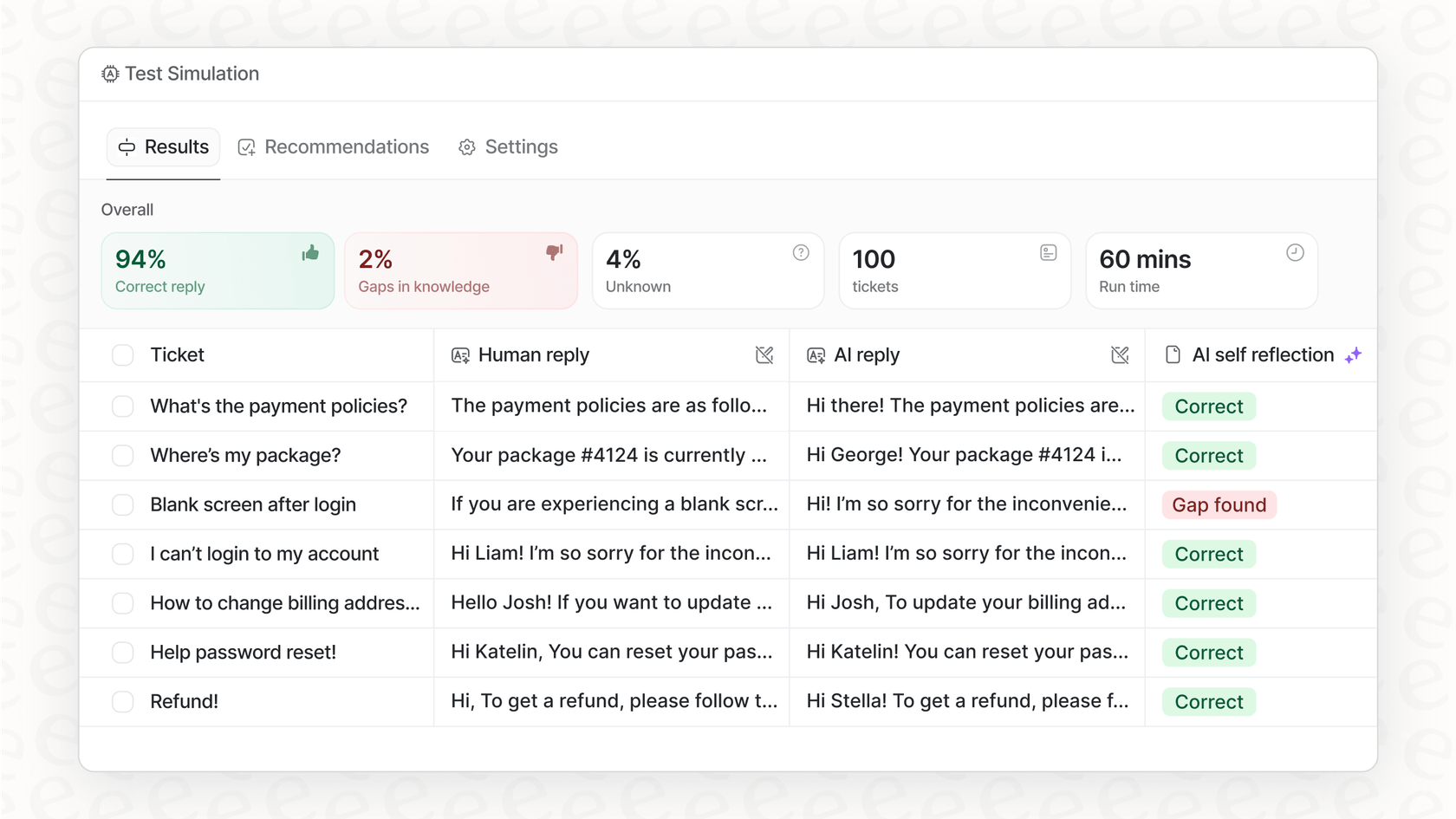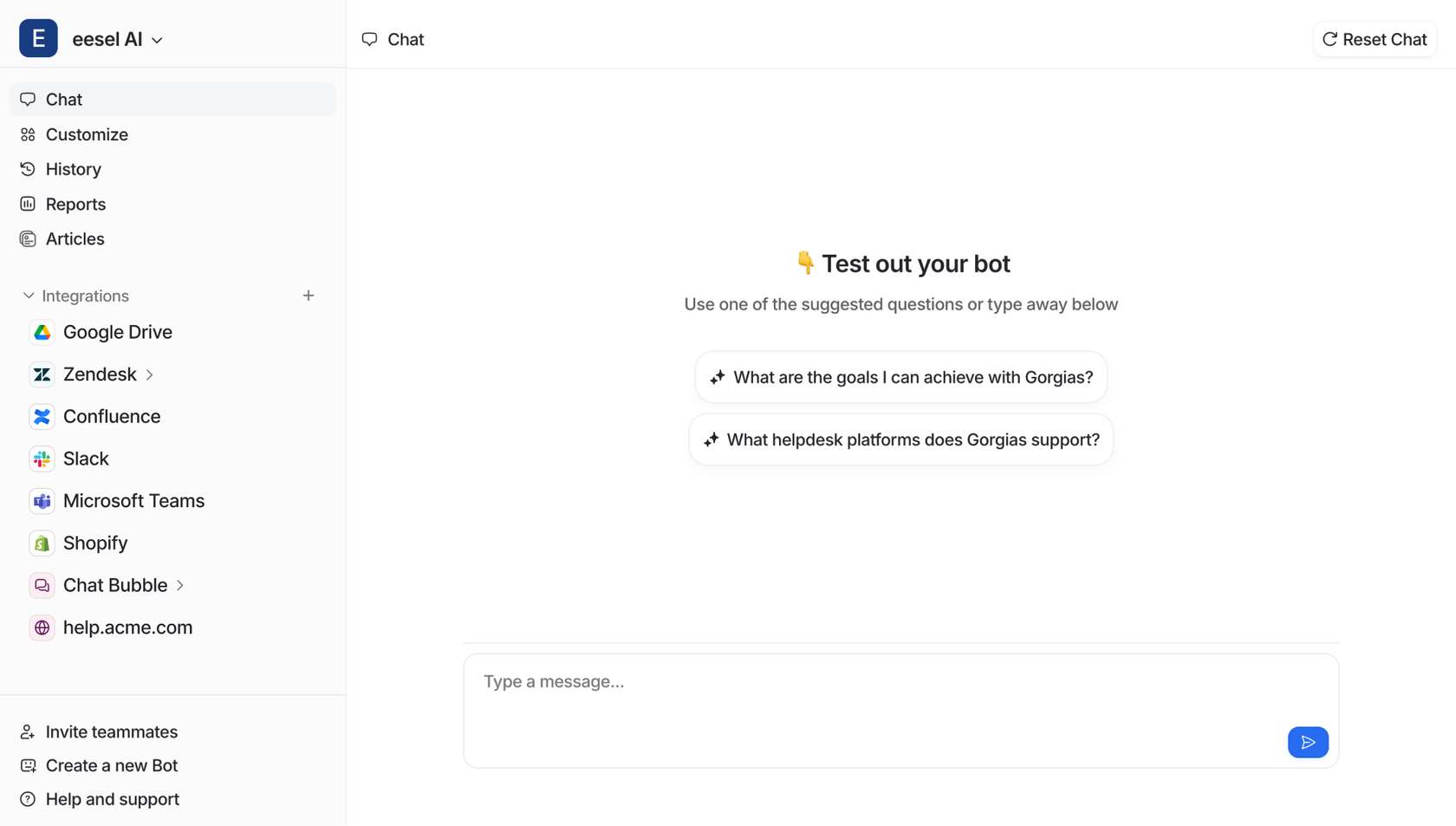Intercom vs Kustomer: A detailed comparison for 2024

Stevia Putri
Last edited September 27, 2025

Picking the right customer service platform feels like a huge commitment, doesn’t it? It’s one of those big decisions that can shape how your team works and, more importantly, how your customers feel about you. It’s easy to get bogged down in feature lists, grand promises, and pricing pages that feel like they require a decoder ring.
Two of the heaviest hitters you’ll run into are Intercom and Kustomer. They both promise to make your customer service smarter with AI, but they come at it from completely different directions. Intercom grew up around the idea of conversational, real-time chat. Kustomer, on the other hand, built its world around a powerful CRM, aiming to give you a complete historical view of every single customer.
In this guide, we’ll put them head-to-head, looking at their core features, how they use AI, and what their pricing models really mean for your budget. We’ll also talk about a third path, one that lets you get powerful AI without having to uproot your entire support operation.
What is Intercom?
Intercom is all about conversation. It started life as a simple business messenger and has since grown into a full-blown customer service platform built for proactive, in-the-moment engagement. Think of it as the digital version of a helpful shopkeeper who greets you the moment you walk in the door.
Everything in its toolkit is designed around this philosophy:
-
Fin AI Agent: This is Intercom’s own AI chatbot. It’s built to jump into conversations and resolve customer problems directly within the Intercom messenger, using your knowledge base to find answers.
-
Shared Inbox and Ticketing: It gives your team a single place to manage all conversations, whether they come from email, chat, or your app. It’s designed for quick, collaborative replies.
-
Proactive Support: Tools like Product Tours and outbound messages let you reach out to customers with helpful tips or announcements before they even have a chance to get stuck.
Because of this chat-first DNA, Intercom is a go-to for many SaaS companies and online businesses. If your goal is to have rich, real-time conversations, generate leads through your website widget, and guide users through your product, Intercom is built for that world. The whole experience makes the conversation the main event.
What is Kustomer?
Kustomer sees things differently. It’s an AI-powered CRM platform where the customer’s entire journey is the main event, not just a single conversation. Its main goal is to give you a complete, chronological timeline of every interaction a customer has ever had with your business. Every email, chat, phone call, and social media DM is woven together in one continuous story.
Here’s what makes it work:
-
Omnichannel Timeline: This is Kustomer’s bread and butter. It organizes every touchpoint from email, chat, social media, SMS, and voice into a single, unified view for each customer. No more hunting through different systems.
-
AI for Customers & Agents: Kustomer gives you AI bots to handle automated conversations with customers, but it also provides an AI assistant (or copilot) that helps your human agents work faster by suggesting answers and summarizing tickets.
-
CRM-Driven Data: It leans heavily on its own internal CRM to pull customer data, purchase history, and past interactions into every conversation, which helps personalize responses and power its automations.
Kustomer is often a better fit for e-commerce and B2C companies that deal with a high volume of support requests from all over the place. If your agents need to see a customer’s entire history at a glance to solve their problem, Kustomer is built from the ground up to provide that 360-degree view.
A deep dive into their features
Before we get into the pricing headache, let’s look at how these platforms actually function. The way they handle things like AI, integrations, and customization will have a huge impact on your team’s day-to-day life.
AI and automation capabilities
Both platforms shout about their AI from the rooftops, but their approaches come with some pretty big strings attached.
Intercom’s AI (Fin):
Fin is a pretty slick conversational AI that’s baked right into the Intercom platform. It can understand natural language and handle some fairly complex questions. But here’s the catch: Fin only works within Intercom. To use their AI, you have to move your entire helpdesk, knowledge base, and support history into their world. That means all the valuable context from years of customer conversations in your old system gets left behind, forcing the AI to start learning from scratch.
Kustomer’s AI:
Kustomer’s AI is built on the rich data inside its CRM. This allows it to personalize conversations based on a customer’s past behavior and history. It offers both customer-facing bots and an agent copilot, which is a solid combination. The setup, however, can be a bear. To get real value from its AI, you have to spend a lot of time and effort configuring the CRM, building out workflows, and training the system on your specific business rules. It’s powerful, for sure, but it’s definitely not a flip-a-switch solution.
The modern alternative:
Here’s the one thing that both of these platforms overlook: your team’s most valuable asset is the mountain of historical conversations already sitting in your current helpdesk, whether it’s Zendesk, Freshdesk, or something else.
This is where a tool like eesel AI changes the game. Instead of making you move house, eesel AI plugs directly into the helpdesk you already use. It starts training its AI on your past tickets and knowledge articles from the moment you connect it, so it understands your business and your customers’ common problems right away. This lets you skip the massive migration project and get an AI that’s actually helpful from day one.
Even better, eesel AI has a powerful simulation mode. You can run the AI against thousands of your historical tickets to see exactly how it would have replied and resolved them. This gives you a clear, data-backed forecast of its resolution rate, letting you tweak its behavior and build confidence before it ever talks to a real customer. It’s a level of trust that "rip and replace" platforms simply can’t match.
 eesel AI's simulation mode provides a data-backed forecast of its resolution rate, building trust before you go live.
eesel AI's simulation mode provides a data-backed forecast of its resolution rate, building trust before you go live.Platform and integration focus
Intercom can feel a bit like a "walled garden." It has a marketplace with over 450 apps, but the entire experience is designed to keep you living and breathing inside the Intercom ecosystem. Its strength is how smoothly its own tools, like chat, articles, and outbound campaigns, all work together.
Kustomer is built to be a "central hub." Its primary job is to pull data from all your other systems into its CRM to create that single customer view. While it may have fewer total integrations than Intercom, it focuses on creating deep connections with larger enterprise systems.
The big problem with both is that they force a "rip and replace" strategy. You have to commit to moving your entire support operation into their world. We’re talking about migrating years of data, retraining every single agent on a new platform, and rebuilding all your hard-won workflows from the ground up. It’s a huge project that can easily take months and pull your team’s focus away from customers.
There’s a much simpler way. eesel AI is designed to go live in minutes. It offers one-click integrations with the most popular helpdesks, including Zendesk, Freshdesk, and even Intercom itself. This means you can layer powerful, next-generation AI onto the tools your team already knows and loves. You get the benefits of amazing AI without the operational nightmare of a forced migration.
 eesel AI offers one-click integrations with popular helpdesks to get you started in minutes.
eesel AI offers one-click integrations with popular helpdesks to get you started in minutes.Customization and control
Intercom gives you a solid amount of control over how its bots behave, the design of its messenger widget, and the targeting of your campaigns. The customization is centered on shaping the conversation.
Kustomer lets you get deep into the weeds of customizing the agent workspace, its data structure (using "K-Objects"), and its workflow automation engine. Here, the control is all about shaping data and processes.
But what about the kind of control that really matters? A lot of AI tools have a frustrating all-or-nothing feel. You turn them on and just hope they do a good job.
That’s why having granular control is so important. With eesel AI’s fully customizable workflow engine, you get to be the director. You can create precise rules that tell the AI to only handle simple "where’s my order?" questions while instantly escalating anything more complex to a human agent. You can also define custom actions, like automatically tagging tickets, updating customer fields, or even pinging an external system via an API call. This selective approach to automation lets you start small, prove the value, and scale up your AI’s responsibilities safely. It’s a huge step up from rigid, black-box systems.
Intercom vs Kustomer: A pricing comparison
Alright, let’s talk about the part that often causes the most stress: pricing. Both Intercom and Kustomer have models that can be complex, difficult to predict, and ultimately, quite expensive.
Intercom’s pricing structure
Intercom’s pricing has a few moving parts that can make it tough to forecast your monthly bill.
-
Seat-based fee: You pay a monthly fee for each agent on your team. Their main plans run $29, $85, or $132 per agent per month when you pay annually.
-
Resolution-based fee: This is the big one. They charge you $0.99 for every single conversation that the Fin AI Agent resolves.
-
Add-ons: Need key features like advanced proactive support? That’s often an extra monthly fee on top of everything else (in this case, another $99).
The catch with the per-resolution model is obvious: it punishes you for being successful. As your business grows and your support volume goes up, your AI bill can climb surprisingly fast, especially during your busiest seasons.
Kustomer’s pricing structure
Kustomer’s pricing structure also uses a mix of agent licenses and add-ons that can add up quickly.
-
Seat-based fee: Their plans are priced per agent, starting at $89 per agent per month for their Enterprise plan and going up to $139 for their Ultimate plan, also billed annually.
-
AI Add-ons: Their AI features aren’t included in the base price. "AI Agents for Customers" costs $0.60 per engaged conversation, and their "AI Agents for Reps" (the copilot) costs an additional $40 per agent per month.
While their per-conversation fee is lower than Intercom’s, the total cost gets very high once you bundle the expensive seats with the AI add-ons you need to make it all work. You could easily be paying over $150 per agent each month for the complete package.
A more transparent pricing alternative
The tangled pricing of these platforms makes eesel AI’s pricing feel like a breath of fresh air. It’s built to be simple and predictable.
-
No per-resolution fees: This is the most important difference. eesel AI plans come with a flat monthly fee that includes a large bucket of AI interactions (an "interaction" is any answer or action the AI takes). Your bill doesn’t shoot up just because you had a busy month.
-
All-inclusive plans: All of eesel AI’s main products, including the AI Agent, Copilot for agents, and automated Triage, are included in every single plan. You aren’t nickel-and-dimed for the features you need.
-
Predictable and scalable: With a flat fee, you know exactly what to expect on your invoice. This makes budgeting so much easier and gets rid of the anxiety that comes with usage-based billing.
| Feature | Intercom | Kustomer | eesel AI |
|---|---|---|---|
| Base Model | Per Seat | Per Seat | Flat Fee (Interaction-based) |
| AI Pricing | $0.99 / AI resolution | $0.60 / engaged conversation + $40/seat/mo for Copilot | Included in plan (no per-resolution fee) |
| Predictability | Low (scales with volume) | Medium (add-ons are fixed) | High (flat monthly fee) |
| Transparency | Complex (many add-ons) | Complex (base plan + AI add-ons) | Simple (all-inclusive plans) |
| Starts From | $29/seat/mo + usage | $89/seat/mo + AI add-ons | $299/mo (includes 1,000 interactions) |
Making the right choice for your team
So, after laying it all out, how do you decide? It really boils down to your company’s core needs and how much appetite you have for a major platform change.
-
Choose Intercom if: You’re a SaaS or tech company that lives and dies by proactive, chat-first engagement and lead gen. You also need to be ready to commit fully to their platform and migrate your entire support world into it.
-
Choose Kustomer if: You’re a larger e-commerce or B2C brand where having a powerful, unified CRM view of every customer across every channel is non-negotiable. You’ll also need a healthy budget and the technical team for a pretty involved implementation.
But what if you’re happy with your current helpdesk? For the many teams who just want to add powerful, easy-to-use, and predictably priced AI to their existing setup, there’s a much better way. An integrated solution that works with your stack is almost always the more efficient and cost-effective path.
This Kustomer product tour provides a closer look at its CRM-driven, omnichannel platform.
Get powerful AI without switching your helpdesk
eesel AI was built to solve the exact problems that platforms like Intercom and Kustomer create. You can get it up and running in minutes, not months. You can train the AI on your real ticket history for incredible accuracy from day one. You can test it with total confidence using simulation mode. And you can do it all with simple, predictable pricing that doesn’t penalize you with per-resolution fees.
Ready to see what next-gen AI can do for your current support setup? Try eesel AI for free or book a demo to see how you can automate support in minutes.
Frequently asked questions
Intercom focuses on real-time, chat-first conversational support and proactive engagement, ideal for SaaS companies. Kustomer, conversely, is a CRM-driven platform that provides a 360-degree view of the customer’s entire journey, better suited for high-volume B2C environments.
Intercom’s Fin AI Agent is great for resolving issues directly within its messenger. Kustomer’s AI leverages its robust CRM data for personalized customer interactions and also offers an agent copilot. Both require significant setup and migration to fully utilize their AI effectively.
Intercom charges per agent plus a per-resolution fee for its AI, which can make costs unpredictable with success. Kustomer also uses per-agent pricing, but its AI features are add-ons with separate per-conversation fees for customer-facing bots and an additional per-agent fee for the copilot, leading to higher bundled costs.
Both platforms typically require a "rip and replace" strategy, forcing you to migrate existing data and retrain teams, which is a major project. An alternative like eesel AI integrates directly with your current helpdesk, allowing you to add powerful AI without a full system migration.
Intercom is ideal for SaaS companies prioritizing proactive chat, lead generation, and in-app guidance. Kustomer suits larger e-commerce or B2C brands that need a comprehensive, unified view of customer interactions across multiple channels.
Implementing either Intercom vs Kustomer generally involves a substantial migration effort. This includes moving years of historical data, retraining your entire support team on a new interface, and rebuilding workflows from scratch, which can take months to complete.
Intercom offers customization primarily focused on shaping conversations, bot behavior, and messenger design. Kustomer allows for deeper customization of the agent workspace, data structures, and complex workflow automation, centered around customer data and processes.




